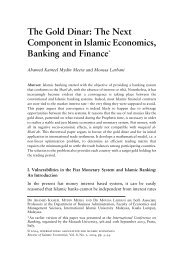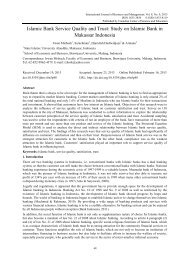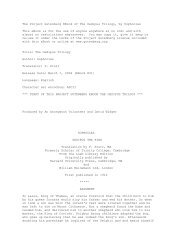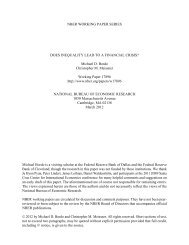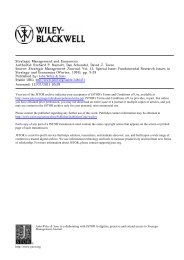The Oil Industry in Nazi Germany, 1936-1945
The Oil Industry in Nazi Germany, 1936-1945
The Oil Industry in Nazi Germany, 1936-1945
Create successful ePaper yourself
Turn your PDF publications into a flip-book with our unique Google optimized e-Paper software.
NAZI OIL INDUSTRY 267<br />
Allied attack on the German oil <strong>in</strong>dustry <strong>in</strong> mid-1944, <strong>Germany</strong>'s an-<br />
nual domestic hydrogenation capacity, most of which was directly con-<br />
trolled or licensed by I. G., exceeded four million tons. In addition,<br />
hydrogenation plants with a projected annual capacity of well over one<br />
million tons were under construction <strong>in</strong> Silesia and the Sudetenland<br />
when the war ended.36<br />
In contrast, <strong>Germany</strong>'s domestic Fischer-Tropsch capacity <strong>in</strong> oper-<br />
ation when the war broke out was a mere 240,000 tons. This capacity<br />
was expanded considerably by May 1940, when plants that could pro-<br />
duce 414,000 tons a year were <strong>in</strong> operation. No new Fischer-Tropsch<br />
plants were constructed after 1940, however; thus, the ultimate<br />
Fischer-Tropsch annual capacity of 587,000 tons simply reflected the<br />
completion of plants designed and started before the war." <strong>The</strong> differ-<br />
ence is substantial and must be expla<strong>in</strong>ed. Why was the hydrogenation<br />
process preferred to the Fischer-Tropsch process?<br />
<strong>The</strong> question was put directly to He<strong>in</strong>rich Biitefisch <strong>in</strong> a series of<br />
<strong>in</strong>terrogations by British technical <strong>in</strong>vestigators <strong>in</strong> January 1946. Bii-<br />
tefisch, a director of I.G. Farben and chief of the I.G. Leuna works,<br />
which conta<strong>in</strong>ed the first and one of the largest Bergius operations,<br />
stressed <strong>in</strong>terrelated technical and economic factors <strong>in</strong> his replies. On<br />
the technical side, he noted that the Fischer-Tropsch process used<br />
more raw material than did the hydrogenation process. Moreover, the<br />
preferred basic raw material was scarcer than that generally used <strong>in</strong><br />
the Bergius operation. Coke, required for optimum production <strong>in</strong> the<br />
Fischer-Tropsch process, was <strong>in</strong> short supply <strong>in</strong> wartime <strong>Germany</strong> be-<br />
cause of <strong>in</strong>creased steel production, while Bergius production used<br />
more plentiful brown coal, or lignite, and other brown-coal products,<br />
such as coal tars. F<strong>in</strong>ally, the petroleum products of the Fischer-<br />
Tropsch process were <strong>in</strong>ferior <strong>in</strong> quality to those produced by the Ber-<br />
gius process. Fischer-Tropsch yielded a synthetic crude that could be<br />
processed <strong>in</strong>to low-octane motor fuel (40-45 octane), for <strong>in</strong>stance,<br />
while hydrogenation yielded much higher-grade products.38<br />
<strong>The</strong> economic factors cited by Biitefisch are tied to the technical<br />
factors. Partly because of the relative scarcity of coke, and the need for<br />
larger amounts of raw material, the Fischer-Tropsch process was con-<br />
siderably more expensive than hydrogenation. Accord<strong>in</strong>g to Biitefisch's<br />
rough calculations, summarized <strong>in</strong> Table 1, the cost of produc<strong>in</strong>g one<br />
metric ton of liquid products through the Fischer-Tropsch process was<br />
RM 320-360. In contrast, the cost of produc<strong>in</strong>g one metric ton of mo-<br />
36 Hughes, 120ff; USSBS 113, German <strong>Oil</strong> <strong>Industry</strong>, sec. 2.04, 43, and sec. 1.08, Table 15, 31.<br />
37 USSBS 113, sec. 108, Table 15, 31, and sec. 2.07, 48.<br />
. British Intelligence Objectives Subcommittee, BIOS Report 1697, Synthetic <strong>Oil</strong> Production <strong>in</strong> Ger-<br />
many: Interrogation of Dr. Biitefisch (London, n.d.), 2.



